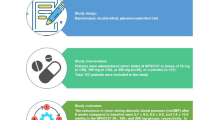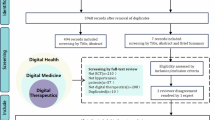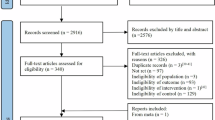Abstract
Sibutramine is a serotonin-noradrenaline reuptake inhibitor that is effective for long-term weight reduction and maintenance in obese patients when used as an adjunct to dietary and behavioural measures. Because the inhibition of noradrenaline reuptake may be expected to increase systolic and diastolic blood pressure (SBP and DBP) and pulse rate (PR), a 12-week multi-centre, placebo-controlled, double-blind study was designed to evaluate the efficacy and tolerability of sibutramine for weight loss in obese patients whose hypertension was well controlled (DBP ⩽95 mm Hg) by β-adrenergic blocking agents (β-blockers), with or without concomitant thiazide diuretics. Of the 61 patients randomised to sibutramine 20 mg once daily or placebo, 55 patients (90%) completed the study. After 12 weeks, sibutramine-treated patients lost significantly more weight than placebo-treated patients: mean weight reductions were 4.2 kg (4.5%) in the sibutramine group vs 0.3 kg (0.4%) in the placebo group (P<0.001). Greater weight reduction on sibutramine was accompanied by trends for greater mean reductions in serum triglycerides and very low density lipoprotein cholesterol. Sibutramine was well tolerated, and most adverse events were mild or moderate in severity. No sibutramine patient discontinued treatment because of an adverse event. Mean supine and standing DBP and SBP were not statistically significantly different between the sibutramine group and the placebo group at any post-baseline visit during the 12-week trial. At week 12, mean increases from baseline supine SBP and DBP, respectively, were 1.6 and 1.7 mm Hg for the sibutramine group vs increases of 0.4 and 1.3 mm Hg for the placebo group. At week 12, mean increases from baseline standing SBP and DBP, respectively, were 1.5 and 1.8 mm Hg for the sibutramine group vs an increase of 0.3 and a decrease of 0.8 mm Hg for the placebo group (P > 0.05 for treatment comparison). A statistically significant mean increase of 5.6 bpm (±8.25, s.d.) in supine PR from a baseline of 62 bpm was reported in sibutramine-treated patients at week 12, whereas placebo-treated patients had a mean supine PR decrease of 2.2 bpm (±6.43) (P < 0.001). In summary, sibutramine was well tolerated and effective in weight reduction. The addition of sibutramine did not result in an increase in BP in obese patients whose hypertension was well controlled by a β-blocker. However, based on the potential for changes in BP and PR, obese patients being treated with sibutramine should be monitored periodically for changes in BP and PR and managed appropriately.
This is a preview of subscription content, access via your institution
Access options
Subscribe to this journal
Receive 12 digital issues and online access to articles
$119.00 per year
only $9.92 per issue
Buy this article
- Purchase on SpringerLink
- Instant access to full article PDF
Prices may be subject to local taxes which are calculated during checkout



Similar content being viewed by others
References
Joint National Committee on Prevention, Detection, Evaluation and Treatment of High Blood Pressure. The sixth report of the Joint National Committee on Prevention, Detection, Evaluation, and Treatment of High Blood Pressure Arch Intern Med 1997 157: 2413–2446
Guidelines Subcommittee of the World Health Organization-International Society of Hypertension Mild Hypertension Liaison Committee. 1999 World Health Organization-International Society of Hypertension guidelines for the management of hypertension J Hypertens 1999 17: 151–183
National Task Force on the Prevention and Treatment of Obesity. Long-term pharmacotherapy in the management of obesity JAMA 1996 276: 1907–1915
Finer N et al. Sibutramine is effective for weight loss and diabetic control in obesity with type 2 diabetes: a randomised, double-blind, placebo-controlled study Diabetes, Obes Metab 2000 2: 105–112
Fujioka K et al. Weight loss with sibutramine improves glycaemic control and other metabolic parameters in obesepatients with type 2 diabetes mellitus Diabetes, Obes Metab 2000 2: 175–187
Apfelbaum M et al. Long-term maintenance of weight loss after a very-low-calorie diet: a randomized blinded trial of the efficacy and tolerability of sibutramine Am J Med 1999 106: 179–184
Bray GA et al. A double-blind randomized placebo-controlled trial of sibutramine Obes Res 1996 4: 263–270
Luque CA, Rey JA . Sibutramine: a serotonin-norepinephrine reuptake-inhibitor for the treatment of obesity Ann Pharmacother 1999 33: 968–978
Gundlah C, Martin KF, Heal DJ, Auerbach SB . In vivo criteria to differentiate monoamine reuptake inhibitors from releasing agents: sibutramine is a reuptake inhibitor J Pharmacol Exp ther 1997 283: 581–591
Cole JO et al. Sibutramine: a new weight loss agent without evidence of the abuse potential associated with amphetamines J Clin Psychopharmacol 1998 18: 231–236
Schuh LM, Schuster CR, Hopper JA, Mendel CM . Abuse liability assessment of sibutramine, a novel weight control agent Psychopharmacology 2000 147: 339–346
Bach DS et al. Absence of cardiac valve dysfunction in obesepatients treated with sibutramine Obes Res 1999 7: 363–369
US Department of Health and Human Services. Cardiac valvulopathy associated with exposure to fenfluramine or dexfenfluramine: US Department of Health and Human Services Interim Public Health Recommendations, November 1997 MMWR Morb Mortal Wkly Rep 1997 46: 1061–1066
Heal DJ et al. A comparison of the effects of sibutramine hydrochloride, bupropion and methamphetamine on dopaminergic function: evidence that dopamine is not a pharmacological target for sibutramine Psychopharmacology (Berl) 1992 107: 303–309
Bray GA et al. Sibutramine produces dose-related weight loss Obes Res 1999 7: 189–198
Fanghänel G, Cortinas L, Sánchez-Reyes L, Berber A . A clinical trial of the use of sibutramine for the treatment ofpatients suffering essential obesity Int J Obes Relat Metab Disord 2000 24: 144–150
Cuellar GEM, Ruiz AM, Monsalve MCR, Berber A . Six-month treatment of obesity with sibutramine 15 mg; a double-blind, placebo-controlled monocenter clinical trial in a Hispanic population Obes Res 2000 8: 71–82
Fizames C . How to improve the medical quality of the coding reports based on WHO-ART and COSTART use Drug Information J 1997 31: 85–92
Hansen DL et al. Thermogenic effects of sibutramine in humans Am J Clin Nutr 1998 68: 1180–1186
Walsh KM, Leen E, Lean MEJ . The effect of sibutramine on resting energy expenditure and adrenaline-induced thermogenesis in obese females Int J Obes Relat Metab Disord 1999 23: 1009–1015
Lafontan M, Berlan M . Fat cell adrenergic receptors and the control of white and brown fat cell function J Lipid Res 1993 34: 1057–1091
Seagle HM, Bessesen DH, Hill JO . Effects of sibutramine on resting metabolic rate and weight loss in overweight women Obes Res 1998 6: 115–121
Mayfield KP et al. Beta-adrenergic receptor subtype effects on stress fever and thermoregulation Neuroimmunomodulation 1999 6: 305–317
Staessen JA, Wang JG, Birkenhager WH, Fagard R . Treatment with beta-blockers for the primary prevention of the cardiovascular complications of hypertension Eur Heart J 1999 20: 11–25
Hirsch J, Mackintosh RM, Aronne LJ . The effects of drugs used to treat obesity on the autonomic nervous system Obes Res 2000 8: 227–233
Meridia® (sibutramine hydrochloride monohydrate) capsules. In: Physicians’ Desk Reference Medical Economics Company, Inc: Montvale, NJ 2000 pp 1494–1498
Eckel RH for the Nutrition Committee. Obesity in heart disease. A statement for healthcare professionals from the Nutrition Committee, American Heart Association Circulation 1997 96: 3248–3250
Weintraub M et al. Sibutramine in weight control: a dose-ranging, efficacy study Clin Pharmacol Ther 1991 50: 330–337
Acknowledgements
The authors wish to thank Wanda J Krall, PhD, for assistance in writing this manuscript. This study was supported by Abbott Laboratories, Abbott Park, IL, USA.
Author information
Authors and Affiliations
Corresponding author
Rights and permissions
About this article
Cite this article
Sramek, J., Leibowitz, M., Weinstein, S. et al. Efficacy and safety of sibutramine for weight loss in obese patients with hypertension well controlled by β-adrenergic blocking agents: a placebo-controlled, double-blind, randomised trial. J Hum Hypertens 16, 13–19 (2002). https://doi.org/10.1038/sj.jhh.1001299
Published:
Issue date:
DOI: https://doi.org/10.1038/sj.jhh.1001299
Keywords
This article is cited by
-
Treatment strategies for obesity-related hypertension
Current Hypertension Reports (2008)
-
Influence of Sibutramine on blood pressure: evidence from placebo-controlled trials
International Journal of Obesity (2005)
-
Efficacy and safety of sibutramine in 2225 subjects with cardiovascular risk factors: short-term, open-label, observational study
Journal of Human Hypertension (2005)
-
Drug Insight: appetite suppressants
Nature Clinical Practice Gastroenterology & Hepatology (2005)
-
Paradoxical effect of sibutramine on autonomic cardiovascular regulation in obese hypertensive patients
Clinical Autonomic Research (2005)



